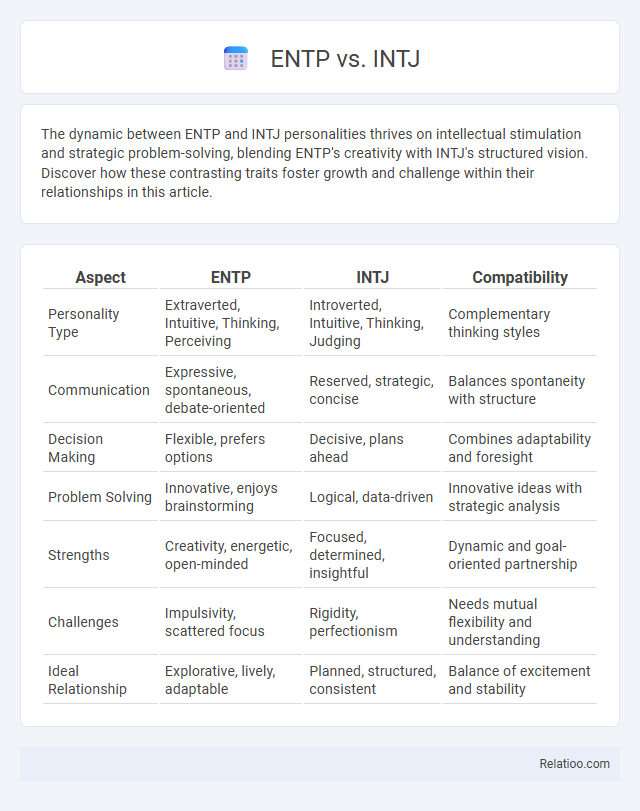The dynamic between ENTP and INTJ personalities thrives on intellectual stimulation and strategic problem-solving, blending ENTP's creativity with INTJ's structured vision. Discover how these contrasting traits foster growth and challenge within their relationships in this article.
Table of Comparison
| Aspect | ENTP | INTJ | Compatibility |
|---|---|---|---|
| Personality Type | Extraverted, Intuitive, Thinking, Perceiving | Introverted, Intuitive, Thinking, Judging | Complementary thinking styles |
| Communication | Expressive, spontaneous, debate-oriented | Reserved, strategic, concise | Balances spontaneity with structure |
| Decision Making | Flexible, prefers options | Decisive, plans ahead | Combines adaptability and foresight |
| Problem Solving | Innovative, enjoys brainstorming | Logical, data-driven | Innovative ideas with strategic analysis |
| Strengths | Creativity, energetic, open-minded | Focused, determined, insightful | Dynamic and goal-oriented partnership |
| Challenges | Impulsivity, scattered focus | Rigidity, perfectionism | Needs mutual flexibility and understanding |
| Ideal Relationship | Explorative, lively, adaptable | Planned, structured, consistent | Balance of excitement and stability |
ENTP vs INTJ: Key Personality Differences
ENTP personalities are characterized by their extroverted intuition and adaptability, thriving on brainstorming and spontaneous problem-solving, whereas INTJs rely on introverted intuition and strategic planning, demonstrating strong long-term focus and decisiveness. Emotional stability tends to be higher in INTJs due to their preference for structured environments and calculated emotional responses, while ENTPs often exhibit more emotional variability aligned with their exploratory and dynamic nature. These fundamental differences impact conflict resolution, stress management, and interpersonal relationships, highlighting the INTJ's preference for order versus the ENTP's desire for novelty.
Cognitive Functions: ENTP and INTJ Compared
ENTP and INTJ differ significantly in cognitive functions, with ENTP leading with Extraverted Intuition (Ne) and INTJ with Introverted Intuition (Ni), affecting their emotional stability and focus. Your emotional stability is influenced by how ENTP's extroverted, spontaneous Ne drives exploration and adaptability, while INTJ's introverted, structured Ni fosters strategic planning and control. Understanding these cognitive functions helps you balance ENTP's creative flexibility with INTJ's focused decisiveness for improved emotional resilience.
Communication Styles of ENTPs and INTJs
ENTPs communicate with your ideas through charismatic, spontaneous conversations, thriving in debate and brainstorming sessions that encourage exploration and adaptability. INTJs, with their strategic, precise communication style, focus on clarity and long-term planning, often preferring structured dialogue and well-thought-out arguments. Emotional stability varies, as ENTPs may exhibit fluctuating reactions driven by external stimuli, while INTJs typically maintain composed, controlled responses that support their logical communication approach.
Decision-Making Approaches: ENTP vs INTJ
ENTP personalities thrive on flexibility and novelty, using intuitive exploration and spontaneity to fuel creative decision-making. INTJs rely on strategic planning and logical analysis, valuing long-term goals and systematic problem-solving for effective decisions. Emotional stability influences both types differently, where ENTPs may experience fluctuating confidence impacting impulsiveness, while INTJs maintain composed and deliberate judgment under pressure.
Problem-Solving and Creativity in ENTPs and INTJs
ENTPs demonstrate high creativity and adaptability in problem-solving, often generating multiple innovative solutions through divergent thinking. INTJs excel in focused, strategic problem-solving, utilizing structured planning and analytical skills to achieve long-term goals. While ENTPs display variable emotional stability that fuels spontaneous creativity, INTJs maintain consistent emotional control, enhancing their methodical decision-making processes.
Relationship Dynamics: ENTP with INTJ
ENTP and INTJ relationships thrive on intellectual stimulation and complementary strengths, with ENTP's extroverted intuition balancing INTJ's introverted intuition. Emotional stability varies, as INTJs often display higher emotional control, while ENTPs may experience mood fluctuations, requiring understanding to maintain harmony. Your ability to appreciate each other's cognitive styles fosters mutual growth and effective problem-solving within dynamic relationship dynamics.
Work Ethic and Career Choices: ENTP vs INTJ
ENTPs exhibit a flexible work ethic driven by creativity and spontaneity, thriving in careers that allow innovation and dynamic problem-solving, while INTJs maintain a disciplined, strategic approach with a strong focus on long-term goals and structured environments. Your emotional stability influences how you handle stress and decision-making; INTJs typically display higher emotional resilience, which supports their persistence in demanding careers, whereas ENTPs may struggle with consistency under pressure. Choosing between these types in career paths depends on your preference for innovation versus structure and your ability to manage emotional challenges in professional settings.
Conflict Resolution Differences
ENTP personalities approach conflict resolution with adaptability and creative problem-solving, often using humor and debate to navigate disagreements, whereas INTJs prefer structured, strategic methods emphasizing long-term solutions and logical analysis. Emotional stability influences these approaches by moderating stress responses; INTJs typically maintain composure and patience, allowing for calculated conflict management, while ENTPs may experience fluctuations in emotional resilience but compensate through flexibility and open-mindedness. Understanding these dynamics helps tailor conflict resolution strategies to individual cognitive styles and emotional regulation capacities.
Growth and Self-Improvement Strategies
ENTP and INTJ personality types differ significantly in emotional stability, with ENTPs often exhibiting high adaptability and openness to new experiences, while INTJs display greater emotional control and strategic planning. Your growth and self-improvement strategies should emphasize leveraging ENTP's creativity and social engagement alongside INTJ's analytical strengths and disciplined focus. Cultivating emotional stability through mindfulness practices and structured goal-setting enhances resilience, enabling balanced development across both personality types.
Which Personality Type Is Right for You?
ENTP personalities excel in creativity and adaptability, thriving in dynamic environments that require innovative problem-solving, while INTJs prioritize strategic planning and long-term goals, showcasing strong emotional stability through disciplined decision-making. Emotional stability is a critical factor in determining which personality type fits you, as INTJs typically demonstrate higher resilience under stress compared to the more spontaneous ENTPs. Evaluating your preference for structure versus flexibility and your emotional response to stress can help identify whether the analytical INTJ or the charismatic ENTP aligns better with your personal and professional life.

Infographic: ENTP vs INTJ
 relatioo.com
relatioo.com